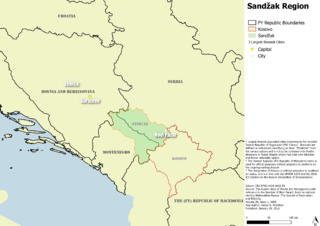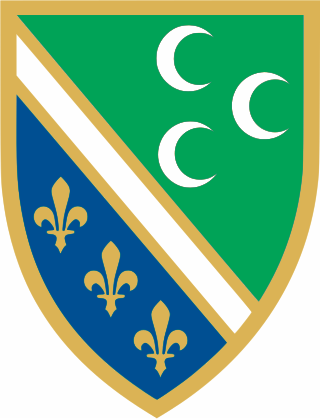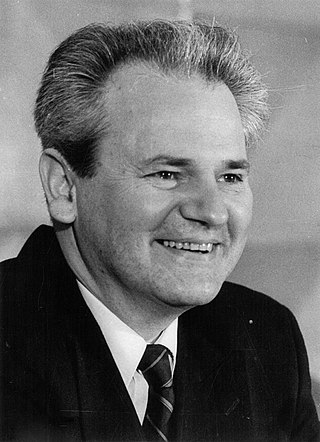
The Balkans, also known as the Balkan Peninsula, is a geographical area in southeastern Europe with various geographical and historical definitions. The region takes its name from the Balkan Mountains that stretch throughout the whole of Bulgaria. The Balkan Peninsula is bordered by the Adriatic Sea in the northwest, the Ionian Sea in the southwest, the Aegean Sea in the south, the Turkish straits in the east, and the Black Sea in the northeast. The northern border of the peninsula is variously defined. The highest point of the Balkans is Musala, 2,925 metres (9,596 ft), in the Rila mountain range, Bulgaria.

Serbia and Montenegro was a country in Southeast Europe located in the Balkans that existed from 1992 to 2006, following the breakup of the Socialist Federal Republic of Yugoslavia which bordered Hungary to the north, Romania to the northeast, Bulgaria to the southeast, Macedonia to the south, Croatia and Bosnia and Herzegovina to the west, and Albania to the southwest. The state was founded on 27 April 1992 as the Federal Republic of Yugoslavia, known as FR Yugoslavia or simply Yugoslavia which comprised the Republic of Serbia and the Republic of Montenegro. In February 2003, FR Yugoslavia was transformed from a federal republic to a political union until Montenegro seceded from the union in June 2006, leading to the full independence of both Serbia and Montenegro.

Yugoslavia was a country in Southeast Europe and Central Europe for most of the 20th century. It came into existence after World War I in 1918 under the name of the Kingdom of Serbs, Croats and Slovenes by the merger of the provisional State of Slovenes, Croats and Serbs with the Kingdom of Serbia, and constituted the first union of the South Slavic people as a sovereign state, following centuries in which the region had been part of the Ottoman Empire and Austria-Hungary. Peter I of Serbia was its first sovereign. The kingdom gained international recognition on 13 July 1922 at the Conference of Ambassadors in Paris. The official name of the state was changed to Kingdom of Yugoslavia on 3 October 1929.

The Yugoslav Wars were a series of separate but related ethnic conflicts, wars of independence, and insurgencies that took place in the SFR Yugoslavia from 1991 to 2001. The conflicts both led up to and resulted from the breakup of Yugoslavia, which began in mid-1991, into six independent countries matching the six entities known as republics which previously composed Yugoslavia: Slovenia, Croatia, Bosnia and Herzegovina, Montenegro, Serbia, and North Macedonia. Yugoslavia's constituent republics declared independence due to unresolved tensions between ethnic minorities in the new countries, which fuelled the wars. While most of the conflicts ended through peace accords that involved full international recognition of new states, they resulted in a massive number of deaths as well as severe economic damage to the region.

Sandžak, also known as Sanjak, is a historical geo-political region in Serbia and Montenegro. The name Sandžak derives from the Sanjak of Novi Pazar, a former Ottoman administrative district founded in 1865. Serbs usually refer to the region by its medieval name of Raška.
Muslims is a designation for the ethnoreligious group of Serbo-Croatian speaking Muslims, inhabiting mostly the territory of the former Yugoslav republics. The term, adopted in 1971, designates Serbo-Croatian speaking Muslims, thus grouping together a number of distinct South Slavic communities of Islamic ethnocultural tradition. Prior to 1993, a vast majority of present-day Bosniaks self-identified as ethnic Muslims, along with some smaller groups of different ethnicity, such as Gorani and Torbeši. This designation did not include Yugoslav non-Slavic Muslims, such as Albanians, Turks and Roma.

Montenegrins are a South Slavic ethnic group that share a common Montenegrin culture, history, and language, identified with the country of Montenegro.
The Yugoslav First Federal Football League, was the premier football league in the Kingdom of Yugoslavia (1918–1941) and Socialist Federal Republic of Yugoslavia (1945–1992).

This article is about the demographics of the Socialist Federal Republic of Yugoslavia during its existence from 1945 until 1991. During its last census in 1991, Yugoslavia enumerated 23,528,230 people. Serbs had a plurality, followed by Croats, Bosniaks, Albanians, Slovenes and Macedonians. With the dissolution of the state, the following nations now have their own demographic studies:

The breakup of Yugoslavia occurred as a result of a series of political upheavals and conflicts during the early 1990s. After a period of political and economic crisis in the 1980s, constituent republics of the Socialist Federal Republic of Yugoslavia split apart, but the unresolved issues caused bitter inter-ethnic Yugoslav wars. The wars primarily affected Bosnia and Herzegovina, neighbouring parts of Croatia and, some years later, Kosovo.

Yugo-nostalgia is a political and cultural phenomenon found among the populations of the former Yugoslavia, in the present-day Bosnia and Herzegovina, Croatia, Montenegro, North Macedonia, Serbia, Kosovo, and Slovenia. It refers to an emotional longing for a time past when the splintered states were a part of one country, grief over the war that tore it apart, and a desire to again unite. Self-described "Yugo-nostalgics" may assert their grief that brotherly love, unity, and coexistence failed, while division and nationalism won, or they may assert that their quality of life was better.

This article is about the demographic features of the population of Montenegro, including population density, ethnicity, education level, health of the populace, economic status, religious affiliations and other aspects of the population.
Languages of Yugoslavia are all languages languages spoken in former Yugoslavia. They are mainly Indo-European languages and dialects, namely dominant South Slavic varieties as well as Albanian, Aromanian, Czech, German, Italian, Venetian, Balkan Romani, Romanian, Rusyn, Slovak and Ukrainian languages. There are also pockets where non-Indo-European languages such as Hungarian, Turkish, etc. varieties are spoken.
The Yugoslav Wars were a series of armed conflicts on the territory of the former Socialist Federal Republic of Yugoslavia (SFRY) that took place between 1991 and 2001. This article is a timeline of relevant events preceding, during, and after the wars.

Bosniaks are the fourth largest ethnic group in Serbia after Serbs, Hungarians and Roma, numbering 145,278 or 2.02% of the population according to the 2011 census. They are concentrated in south-western Serbia, and their cultural centre is Novi Pazar.

Slobodan Milošević was a Serbian politician who was the president of Serbia and president of the Federal Republic of Yugoslavia from 1997 to 2000. Formerly a high-ranking member of the League of Communists of Serbia (SKS) during the 1980s, he led the Socialist Party of Serbia from its foundation in 1990 until 2006.
Bosnians are people identified with the country of Bosnia and Herzegovina or with the region of Bosnia. As a common demonym, the term Bosnians refers to all inhabitants/citizens of the country, regardless of any ethnic, cultural or religious affiliation. It can also be used as a designation for anyone who is descended from the region of Bosnia. Also, a Bosnian can be anyone who holds citizenship of the state of Bosnia and Herzegovina and thus is largely synonymous with the all-encompassing national demonym Bosnians and Herzegovinians. This includes, but is not limited to, members of the constituent ethnic groups of Bosnia and Herzegovina: Bosniaks, Serbs, and Croats.
A significant wave of immigration from the former Yugoslavia to Switzerland occurred during the 1990s and 2000s. While moderate numbers of Yugoslav citizens had residence in Switzerland during the 1980s, the bulk of immigration took place as a consequence of the Yugoslav Wars and by family reunion of those who had immigrated during this period.

Montenegrin nationalism is the nationalism that asserts that Montenegrins are a nation and promotes the cultural unity of Montenegrins.
Bosniakisation designates the process of ethnic and cultural assimilation of non-Bosniak individuals or groups into the Bosniak ethnocultural corpus. Historically, bosniakisation was directed mainly towards some other South Slavic groups, like ethnic Muslims (Muslimani) in former Yugoslavia. Since Bosniaks are Sunni Muslims, Bosniakisation was also manifested towards some distinctive ethnoreligious minorities within Serbian and Croatian national corpus, mainly towards Serbian Muslims and Croatian Muslims.












